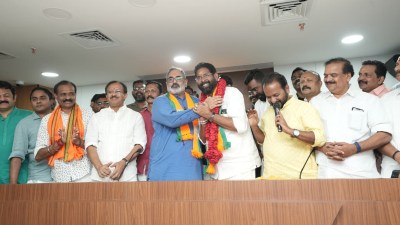Bapsi Sidhwa, Parsi writer who took Partition to the world, dies at 86
She died Wednesday in Houston, Texas. She was 86. She is survived by her novels known for their comedy, tragedy and seamless fusion of the political and personal.
 Bapsi Sidhwa (1938-2024)
Bapsi Sidhwa (1938-2024)For months after her son’s Indian passport was secured, writer Bapsi Sidhwa, who lived in post-Partition Lahore, would go to the Wagah border in the hope of receiving him. Her life was one of those ripped apart by Partition.
The border restrictions that followed forced Sidhwa to leave behind her son in Bombay after the end of her marriage with his father. She had moved back to Lahore, her childhood city, where she had contracted polio as an eight-year-old, was home-schooled until 14, got married at 19, and cultivated ambitions to be a writer.
“Whenever there was a bridge game, I would sneak off and write,” she said in a 1991 interview to The New York Times.
She died Wednesday in Houston, Texas. She was 86. She is survived by her novels known for their comedy, tragedy and seamless fusion of the political and personal.
She didn’t start writing until her 40s, in her second marriage.
“… I wanted to share how Partition affected every single life. It affected my life by taking away my son and it put me through a grieving period for years! You don’t forget it,” she said in a 2013 interview with Stanford University.
Eventually, her son returned to her via the Wagah border. Partition would always be a favoured subject.
Her first novel, The Crow Eaters (1978), published to much backlash in Pakistan, was about a Parsi businessman, a stalwart of his community, who couldn’t tolerate his mother-in-law. The book tracked his fortunes and failures after he uprooted his family’s life in central India and moved them to Lahore.
In a 2012 interview with Dawn, she said, “It was the first novel ever written about the Parsis, and the community was not accustomed to seeing themselves fictionalised or made fun of.”
It was her third novel, Ice-Candy Man (1988), that she used to tackle a more national subject, a story about a Parsi family growing up in Lahore (much like her own), surrounded by a cast of eccentric working-class characters who flanked the pre-teen polio-afflicted protagonist (much like herself).
The novel was renamed for its American publication – Cracking India – a change that didn’t always have admirers.
“The American title… suggests another Midnight’s Children, which it is not; the simplicity of her original title… is truer to the scale of her depiction. The story is not about Partition, though Partition looms large in its pages; it is about… a little girl… who turns 8 at a time when no one feels like celebrating birthdays and who is as concerned about her dawning pubescence as about the freedoms (and fears) of midnight,” wrote Shashi Tharoor in a 1991 review of the novel.
A key childhood memory that made its way to Ice-Candy Man was Sidhwa walking with her gardener as a child and seeing a corpse inside a gunny sack, an incident which deeply affected her.
A similar sense of the personal permeated much of her other works: That of the arrival of Zoroastrians from Persia, fleeing Islamic persecution, on the coast of Gujarat.
In a bid to reject them, the local king sent a jug of milk to their ship, indicating his land had no space for them. They added sugar to it and sent it back, implying their community would sweeten any it mingled with.






